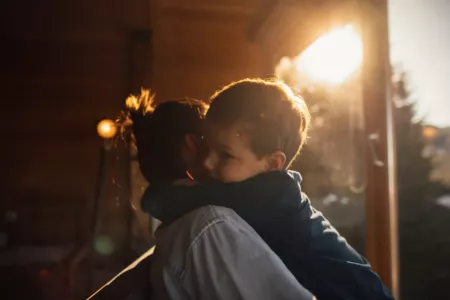Lara's story: Five things I wish I knew before I got divorced
When I got divorced, I wish I'd known to tell the children sooner rather than later, get them into a stable routine, to keep friends out of it, to set boundaries, and to let your ex make their own mistakes.
I’m sure that when we look back on our lives, and the decisions we have made, many of us wish we had had the benefit of hindsight. But unfortunately, you often have to make mistakes first before you can learn.
Divorce is such an alien experience. Most of us never think it will happen to us, so we don't plan for it. Then when it does, our world is turned upside down and inside out, and we often find ourselves reacting to what is happening, rather than standing back and trying to rationalise and plan properly, and that's when we make mistakes.
Whilst everyone’s situation (financial and otherwise) and reasons for divorce vary widely, there are definitely things that are helpful to know in advance, so I wrote this article to try to help others avoid the mistakes I made during divorce.
What I wish I'd known before I got divorced
Tell your children sooner rather than later
The day I had to break the news to my kids that we (their parents) were getting divorced, was the worst day of my life. For several months, my ex-husband refused to let me tell the children, because he was scared of how they'd handle it. In fear of my children overhearing the news from someone else, I felt unable to tell a single friend. By the time it happened, I was an emotional wreck, because I'd been keeping this terrible secret with no support from anyone else. This of course just made it harder to tell them what was happening, and made the experience far worse than it needed to be.
No child wants to hear that their parents are getting divorced. But if it has to happen, what they want to know is that ‘everything will be OK’, that they will still see both parents and that both their parents love them. Seeing a parent in terrible distress will cause them more upset than they need, so tell them once you've prepared yourselves to break the news.
Click here for more advice on how to tell your children you're getting divorced.
Get your children into a routine
If you have children, get them into a routine as soon as you can, as this helps them adjust to their new lives faster. Trying to cushion the blow by doing things ‘like you used to’ makes it hard for the children to adjust to the change. From their perspective, every time Mummy and Daddy do things like they used to, they are going backwards not forwards, and this can potentially confuse children and make them think that you might get back together.
Introducing them to a new home, or a new school, or the new routine for spending time with one of their parents shows them that things are changing, but a routine helps them adjust and begin to accept this new chapter, instead of both you and them constantly trying to make things like they were in the past.
Keep your friends out of it
Although your friends will have the best intentions in the world, their advice can often be clouded by their opinions, what they've heard, and what they've seen on the news or on TV. This can lead to false expectations for you, or skewed perceptions of how the process should go, or how you "should" be feeling.
More impartial support can come from a counsellor or therapist, who is a trained professional and is there just to help you, not to judge you or give you their opinion of your situation or your ex-partner. And most importantly, you can be completely honest, as nothing you say is going to be repeated to the wrong person.
Set boundaries
If you have set days for the children to see the other parent, stick to it. I bent over backwards to accommodate my ex-husband changing his regular days and weekends due to ‘work commitments’. I did it in the belief that it was so important for the children to see their father, I had to be flexible.
After a while, he assumed that he could change days at a whim, to suit his social life. This is something I most definitely would not have got myself into, had I had the benefit of hindsight, and set some boundaries to protect myself. Read more about setting boundaries for co-parenting.
Let your ex make their own mistakes
Any relationship with an ex-partner will be complicated. You'll either be on good terms, and care for them, or they'll be someone that you used to care for. Those feelings can still flare every once in a while, while not romantic. It can be hard to watch them mess things up, or struggle to adjust to their new life. But unless your child is in danger, you have to let it go.
Getting cross, arguing, telling them they’re ‘doing it wrong’, or in any way trying to change their behaviour is a mistake. As harsh as it may sound, it’s none of your business any more. As a co-parent, they are entitled to do things their way when they are in charge of the children.
The only person who will suffer if you try to change things is you.
Hopefully these tips have helped you, or highlighted some areas which you might want to pay attention to during your divorce. If you have any questions or would like some support, please book a free 15-minute consultation with one of amicable's experts.
Read More

Parenting after divorce or separation is tricky for many couples. Different parenting styles may have been one of the reasons that the relationship broke down, or perhaps the idea of not living full-time with your child is still upsetting.

The amicable co-parenting app helps you manage all aspects of co-parenting in one secure place, making parenting after divorce and separation simpler.

Separation and divorce can bring about significant changes, not only in your personal life but also in your responsibilities as a parent. Transitioning from a partner to a co-parenting role often comes with its own set of challenges, including heightened stress levels.

Start your amicable divorce journey
Speak to an amicable Divorce Specialist to understand your options and next steps for untying the knot, amicably.
Your guide to a kinder divorce
What if divorce didn’t have to be a battle?
In amicable divorce, Kate Daly offers compassionate, practical guidance to help you separate in a kinder, better way. Whether you’re just beginning, working through the practicalities or adjusting to co-parenting, this book meets you exactly where you are - and helps you move forward with confidence.
Pre-order on Amazon today






Comments (0)